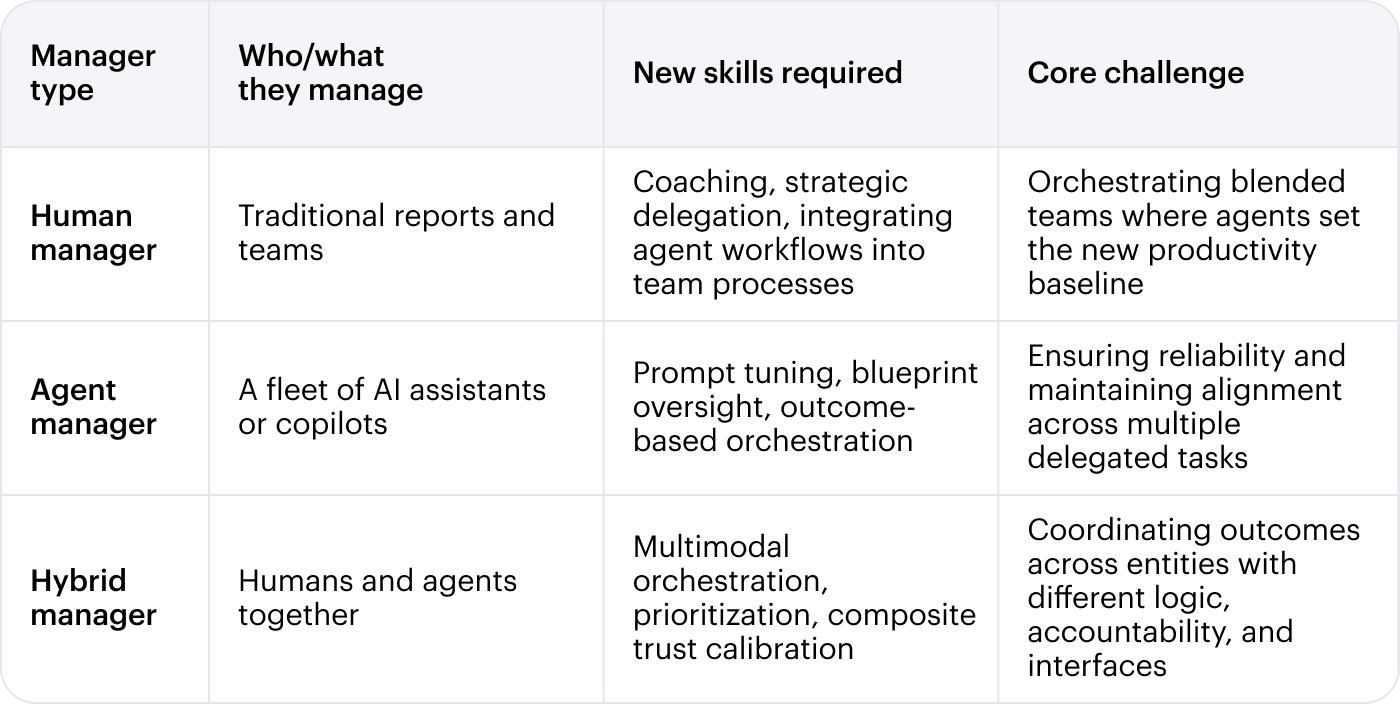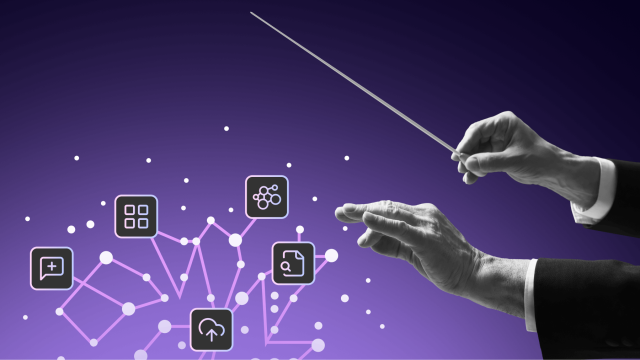Thought leadership
– 6 min read
Everyone is a manager now

AI is turning every employee into a manager. As synthetic agents take over execution, our primary role becomes orchestration: guiding systems, reviewing outcomes, and aligning AI with human collaborators. Welcome to the hybrid workforce.
The invisible shift
In my last post, I argued that AI agents need supervision, not just metrics. That observability isn’t enough when synthetic workers are making decisions, taking actions, and interacting with real people.
But the bigger shift is just beginning. We’re not just adding agents to our workflows, we’re evolving into something new: the hybrid workforce.
This change is already in motion. In customer service, AI agents now handle entire support flows before a human ever sees the ticket. In sales, copilots draft outreach, analyze CRM data, and triage leads. In legal, agents review contracts and propose redlines. These aren’t future concepts, rather they’re active, enterprise-wide deployments.
Some of your teammates are people. Some are AI agents. Some are both—and the lines between them are getting blurrier every day. But we haven’t fully updated our mental models, tools, or org charts to reflect this reality.
This post is about what happens next, what it means when orchestration, not execution, becomes the core of modern work.
The managerization of work
As synthetic agents step into tasks traditionally owned by humans – drafting documents, triaging tickets, and summarizing calls – something unexpected happens:
We’re not all getting promoted. But we are all being transformed. In a hybrid workforce, every knowledge worker becomes a manager: of agents, of outcomes, and increasingly, of systems. Not in title, but in function.
You manage agents that help you execute. You manage human collaborators alongside them. You make decisions about delegation, trust, escalation, and alignment.
The result is a new form of knowledge work: supervisory by default.
This shift is no longer theoretical. It’s happening in real time. In legal, professionals supervise agents that draft redlines. In sales, reps edit AI-generated outreach before sending. In customer service, teams monitor agent behavior to catch policy drift or over-apologizing.
Across domains, execution is no longer the goal. Orchestration is.
From legal to marketing to operations, individual contributors are now:
- Prompting and tuning their own AI tools
- Reviewing and correcting agent output
- Managing a network of agents that require ongoing calibration
This isn’t about automation replacing humans. It’s about augmentation reshaping humans into orchestrators of value.
This shift isn’t just about supervision – it’s about orchestration.
Orchestration is the new meta-skill of knowledge work. In technical systems, orchestration refers to the automated flow of actions between services or agents. In human work, it means something more: aligning both people and systems toward a shared outcome through real-time decisions, oversight, and adaptive judgment. It’s not just about telling agents what to do, it’s about knowing when to delegate, how to monitor, and where to intervene.
Execution delivers value. Orchestration multiplies it.
Three manager modes
In the hybrid workforce, knowledge workers start to fall into three modes of management:

What changes for knowledge work?
The rise of AI agents doesn’t remove the need for knowledge workers, it transforms their role. The traditional IC-manager hierarchy starts to blur as every knowledge worker begins to manage some combination of people, agents, or both.
Here’s how the nature of work changes for each type of manager:

When everyone manages
As every knowledge worker becomes a manager whether of agents, people, or both; the organizational dynamics shift:
- Accountability flattens: More people hold managerial responsibility, even without titles.
- Authority gets distributed: You don’t need a team to have power, you have power if you orchestrate agents well.
- Trust becomes multi-dimensional: We don’t just ask “do I trust this teammate?” but also “do I trust their agents?”
- Skill becomes supervisory: Being good at your job means being good at overseeing systems, not just executing tasks.
These shifts won’t just redefine roles, they’ll restructure how organizations function. The traditional manager hierarchy gives way to something more fluid. Leadership starts to mean orchestration, not headcount. Authority gets tied to systems oversight, not just team ownership. We’ll see new types of roles emerge: agent orchestrators, workflow leads, blueprint owners that don’t map to traditional people leadership, but still hold operational gravity.
In the hybrid enterprise, management is no longer a ladder, it’s a layer in everyone’s role.
And that changes not just what we do, but how we value it.
The upside of orchestration
This shift might sound overwhelming. But it’s also empowering—and ultimately, it points to a new kind of personal leverage.
AI agents give knowledge workers leverage:
- You can delegate more
- You can scale yourself without burning out
- You can focus on higher-order judgment calls, not execution
Supervision isn’t overhead. It’s how knowledge workers scale themselves, how they move from doing the work to multiplying it.
The challenge isn’t job loss. It’s the shift from execution to orchestration: from what you do, to what you enable.
To make this shift successful, we’ll need:
- Tools that surface agent behavior clearly, not just outputs.
- Training that teaches ICs how to supervise, not just execute.
- Performance models that reward orchestration and outcome design.
Redefining work, together
The shift to a hybrid workforce isn’t just about integrating AI. It’s about redefining how work gets done, and who is responsible for making it work.
Managing agents is no longer a specialized function. It’s becoming part of every knowledge worker’s toolkit. And managing humans now requires understanding how they manage and collaborate with agents.
What comes next is a new kind of fluency: one where contribution is measured not only by individual output, but by how well you orchestrate systems, navigate complexity, and ensure aligned outcomes across both human and synthetic teammates.
In this new model:
- Leadership is distributed, not gated by titles
- Delegation becomes strategic infrastructure
- Supervision of people, processes, and agents – is the work
- Scale isn’t just about doing more. It’s about enabling more
The best employees won’t be those who do the most. They’ll be the ones who scale outcomes: safely and with clarity.
This is the evolution of knowledge work—and it’s already underway.
We need new playbooks, new mental models, and a shared language for this transition. Because it’s not just about scaling AI. It’s about scaling ourselves, and the systems we’re now responsible for.
Those who master it won’t just survive the shift. They won’t just adapt to the new era of work. They’ll define it.





